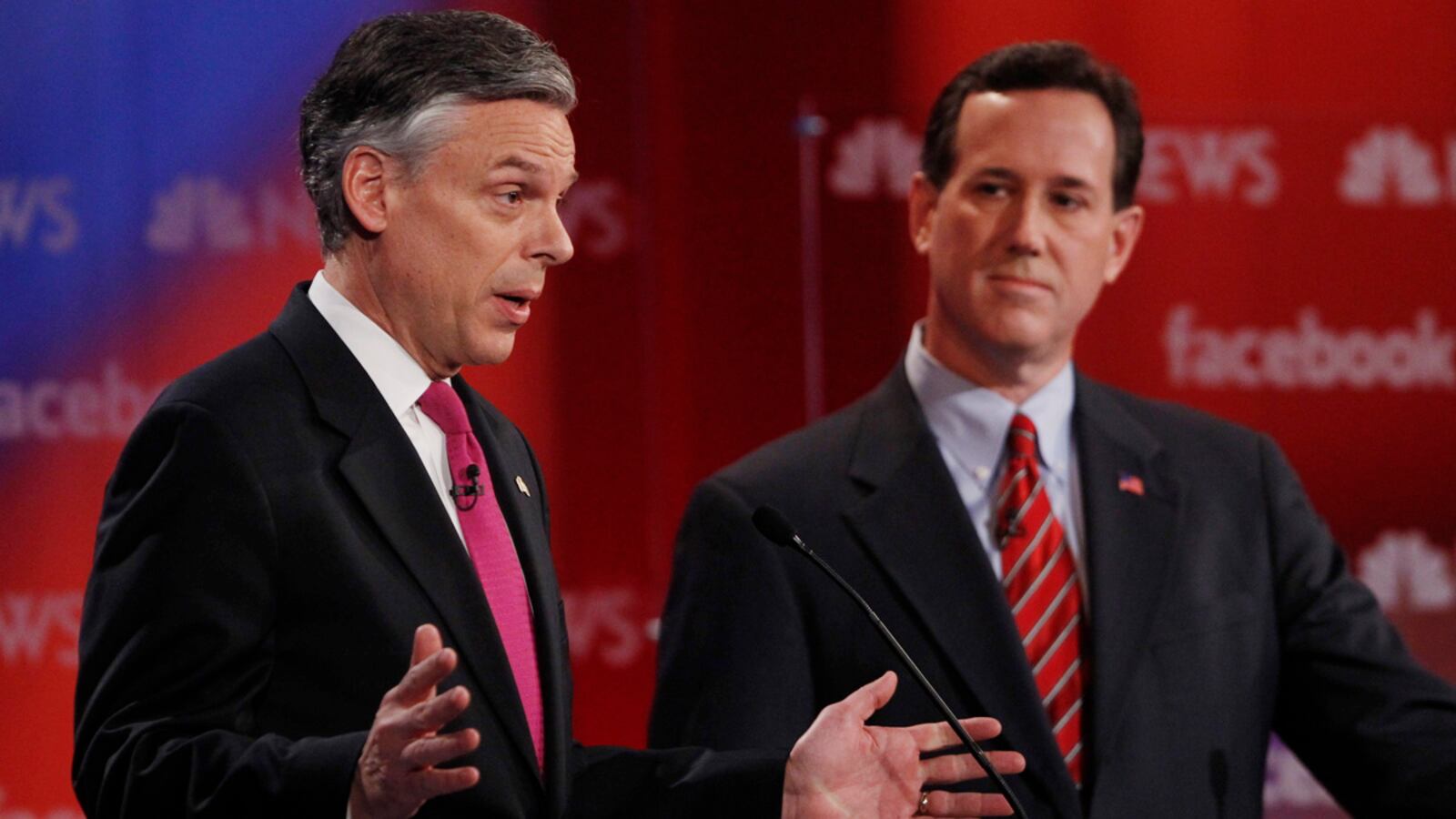Jon Huntsman had his best debate right on time—two days before New Hampshire votes.
And Mitt Romney had his worst debate Sunday morning, finally coming under sustained and substantive fire from his competitors, as well as the debate moderator, Meet the Press host David Gregory.

Remember that New Hampshire is different from all the other primaries in this January gauntlet—it’s open to independents, who make up more than 40 percent of the state’s electorate. And its voters are some of the least religious in the nation, unlike the social conservatives who self-select in the Iowa caucus and dominate in South Carolina.
In total, the arguments that work in the Live Free or Die State translate well to a general election. And that’s why this exchange between Huntsman and Romney, about Huntsman’s service as ambassador to China under President Obama, was so illuminating.
Huntsman: “I was criticized last night by Governor Romney for putting my country first … He criticized me while he was out raising money for serving my country in China. Yes, under a Democrat. Like my two sons are doing in the United States Navy. They're not asking what political affiliation the president is. I want to be very clear with the people here in New Hampshire and this country: I will always put my country first.”
Here was Romney’s response: “I think we serve our country first by standing for people who believe in conservative principles and doing everything in our power to promote an agenda that does not include President Obama's agenda.”
Huntsman’s invocation of his two sons serving in the military is an essential reminder of a bedrock American tradition: our servicemen and women do not make their service contingent on the political persuasion of the president. That’s because they are patriots first, not partisans. Huntsman deserved the applause he received for that line.
Romney’s response seems to me at least as remarkable: “I think we serve our country first by standing for people who believe in conservative principles …” That is the opposite of John McCain’s 2008 campaign slogan, “Country First.” Romney’s answer is “Party First,” “Ideology First.”
And what’s arguably even worse is that Romney probably doesn’t even believe that. He’s a pragmatist in office—but the salesman in him can’t let a pander go by even if it conflicts with his principles.
The other place Romney really got into trouble was his rewriting of his political history in an attempt to draw a contrast with the rest of the field, forgetting that he’s been living in public for at least the past decade. We all know that he’s been running for office since the new millennium began. The Cincinnatus pose he’s trying to adopt doesn’t pass the laugh test.
Here’s what Romney said about why he didn’t try to run for reelection as governor of Massachusetts in 2006: “I went to Massachusetts to make a difference. I didn't go there to begin a political career, running time and time again ... Run again? That would be about me. I was trying to help get the state in the best shape as I possibly could. [Then] I left the world of politics and went back into business.”
Unfortunately 2006 wasn’t that long ago and people have the Internet if not long memories. Romney didn’t run for reelection in 2006 because the polls suggested he might lose. He was traveling the country stumping for candidates as head of the Republican Governors Association as a way of seeding his intended 2008 campaign. He did not return to business. He ran for president, like he always intended. Newt Gingrich, Rick Santorum, and other candidates were entirely right to hit him on this point.
This was a smart and substantive debate, hitting social and foreign policy issues as well as the candidates’ records over the years. Unlike at the ABC debate Saturday night, they didn’t sleepwalk through it.
Again and again, Huntsman took the risk of honesty and directness and was rewarded for it. He holds strong positions on fiscal conservative issues, rightly pointing out that he’s the only candidate to back the Paul Ryan plan from the start. But he did not try to fit in with the ideological clique—he said what he thought was right and seemed both reasonable and presidential as a result. It was refreshing.
It’s likely too late for the kind of popular surge Huntsman would need to win New Hampshire, though the polls are tightening. He remains the only candidate—including the clown candidates—who has so far been denied a broad surge of support. And, not incidentally, he is probably the most electable of the bunch against Barack Obama.
Statements like his response to Romney about serving as ambassador to China for President Obama are the reason why: “The American people are tired of the partisan division. They have had enough. There is no trust left among the American people in the institutions of power and among the American people and our elected officials … And I say we've had enough. We have to change our direction in terms of coming together as Americans, first and foremost.”
It’s both sad and striking that such common sense stands out in the current conservative debates—that it takes some measure of courage to speak for national unity rather than just offering red meat about how the president is a secular socialist. But that’s the kind of courage a real president needs. It’s the commitment that can help unify and then lead.






